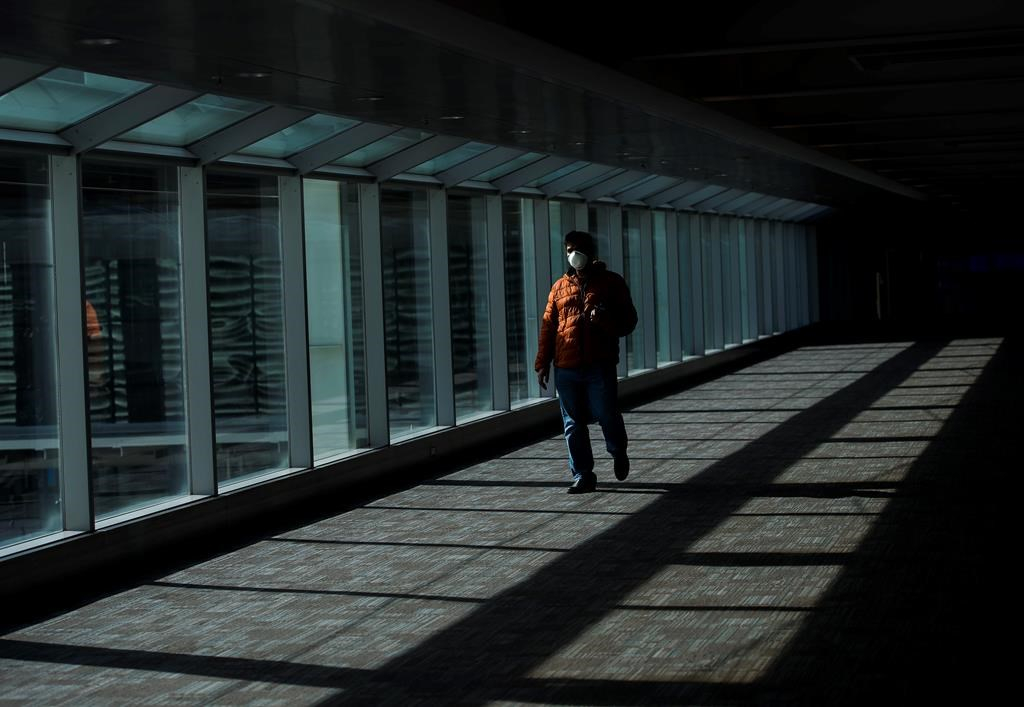Crisis lines and mental health professionals are seeing a jump in calls as Canadians come to grips with the unprecedented disruption caused by the COVID-19 pandemic and the increasingly drastic measures aimed at containing the novel coronavirus.
While some level of concern is both normal and healthy, experts say the risk of overreacting can lead to an inability to function, compulsive panic-buying, or even self-harm.
"We're experiencing a significant increase in calls," Neta Gear, executive director for Distress and Crisis Ontario, said on Monday. "People are very anxious about what's happening. People are feeling worried and scared."
Increasingly, Canadians are being forced to cope with sudden disruptions more normally associated with wartime: Workers are being sent home; schools have closed; sports, entertainment and restaurant venues shut down; vacation plans shattered; and loved ones are stranded abroad.
In addition, those returning from out of country who show symptoms or have had close contact with someone infected are being quarantined or asked to self-isolate for at least two weeks.
Dr. Peter Selby, a clinician-scientist with the Centre for Addiction and Mental Health in Toronto, said previous pandemics such as SARS in 2003 have tended to lead to an increase in mental-health issues and self-harming. It's critical people find supports, Selby said.
"Social isolation doesn't mean emotional isolation," Selby said. "Social isolation doesn't mean lock yourself in your room and only watch TV and don't talk to anybody."
Selby advised limiting exposure to coronavirus-related news and especially to alarmist social media. People in isolation can get trapped watching the same news over and again, which can unnecessarily amplify fears, he said.
"Get information once in the day," Selby said. "You need to reduce the amount of information coming in that is not necessarily productive or helpful."
At the Kids Help Phone, which takes about 1,500 calls and texts a day, overall contacts have only begun to creep up. What has shifted dramatically is the content of the calls.
"We have seen about a 350 per cent increase in young people reaching out with fears related to COVID-19," said Alisa Simon, senior vice president at Kids Help Phone. "It really started ramping up in the middle of last week."
Carlynn McAneeley, with the Alberta Council of Women's Shelters, said increased anxiety and external stressors can accelerate and exacerbate domestic violence.
"Evidence from previous environmental disasters and pandemics suggest that domestic violence will increase during and following this health emergency," McAneeley said. "We are working with shelters to prepare to meet this need."
Chris Summerville, chief executive officer with the Schizophrenia Society of Canada, said stress is a key factor in any type of mental-health relapse. The antidote is to engage in as much positive activity and thinking as possible.
"As much as is possible express care, concern, and love to one another," Summerville said.
Doing something positive can alleviate feelings of helpless as the pandemic rages, experts advise. That could mean volunteering to become a crisis-line responder or engage in activities as simple as trying a new recipe or walking the dog.
For those in distress over COVID-19, experts say, it's especially important to know they are not alone and help is available — even if by phone or text.
"You want to make sure that people who are having stress reactions or are getting suicidal get support right away," Selby said.
In the interim, mental-health services are coping with their own issues of illness or self-isolation even as work-loads increase.
"We know that the anxiety levels are increasing," Simon said. "We anticipate that we are going to see large surges in demand for our service as other services close their doors."
— Some resources for those in crisis:
Crisis Services Canada: 1-833-456-4566 or text 45645; 1-866-277-3553 (from Quebec):
Kids Help Phone: 1-800-668-6868
First Nations and Inuit Hope for Wellness Help Line: 1-855-242-3310
Native Youth Crisis Hotline: 1-877-209-1266
eMentalHealth.ca: https://www.ementalhealth.ca/
This report by The Canadian Press was first published on March 16, 2020.





Comments
I am wondering why Canada does not have the capacity to test much more widely than seems to be the case. South Korea can easily test 20,000 people a day and get a real grip on controlling the spread, but in Canada we are only allowed to test those who show symptoms....excuse me, but that is just not good enough. The fallback is just make everyone self quarantine, shut everything down and all will be fine...and in terms of those coming to Canada from elsewhere, all we are doing is asking them how they feel and giving them a handout as to how to self quarantine. This is a developed country, with a national public health care system, and this is the best we can do??? What am I not understanding here?